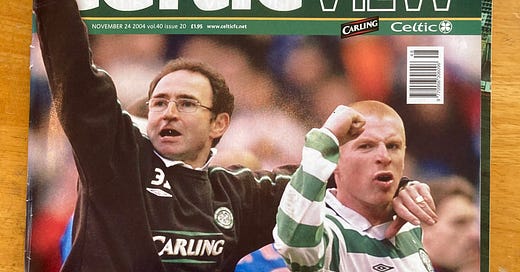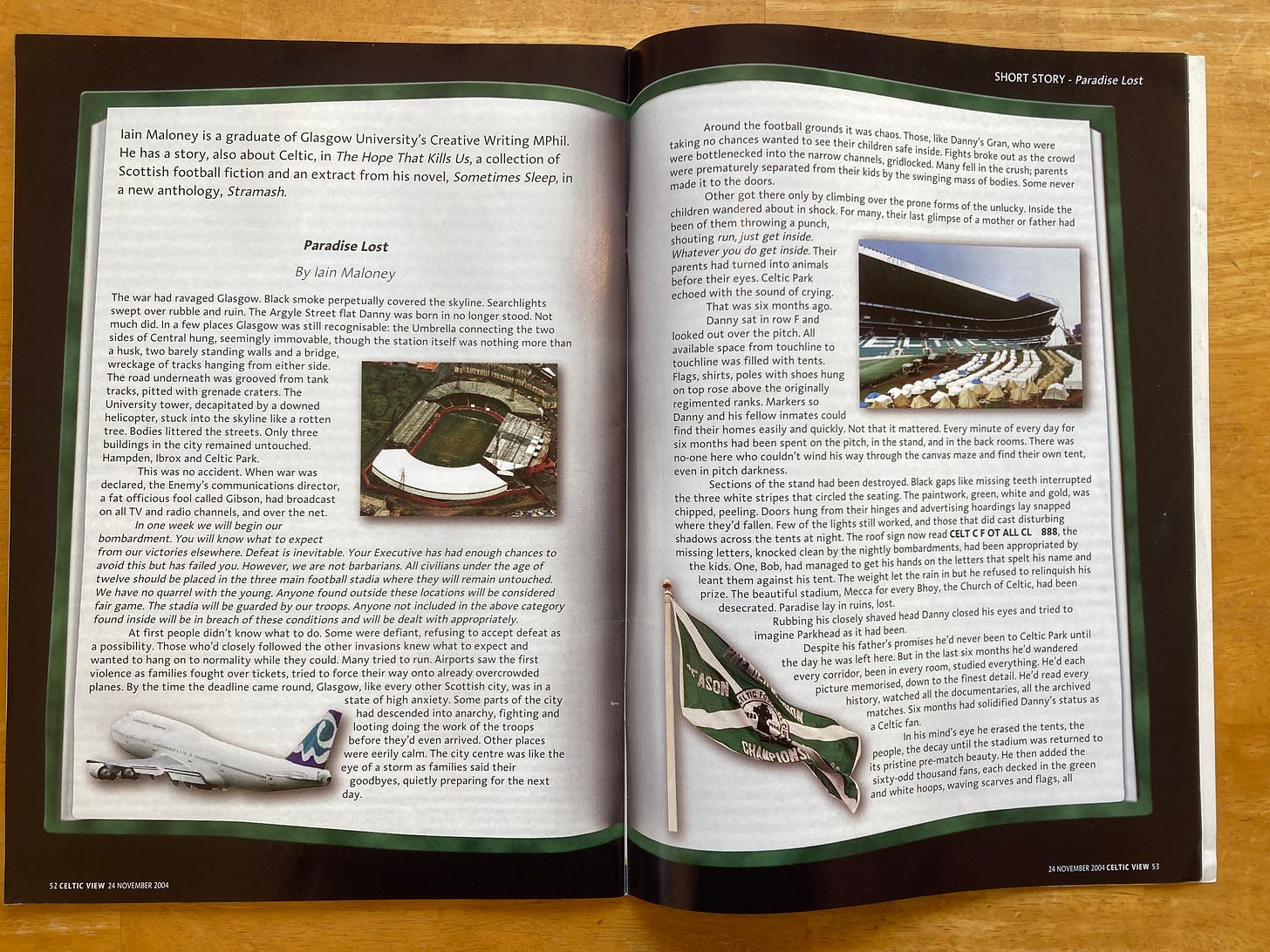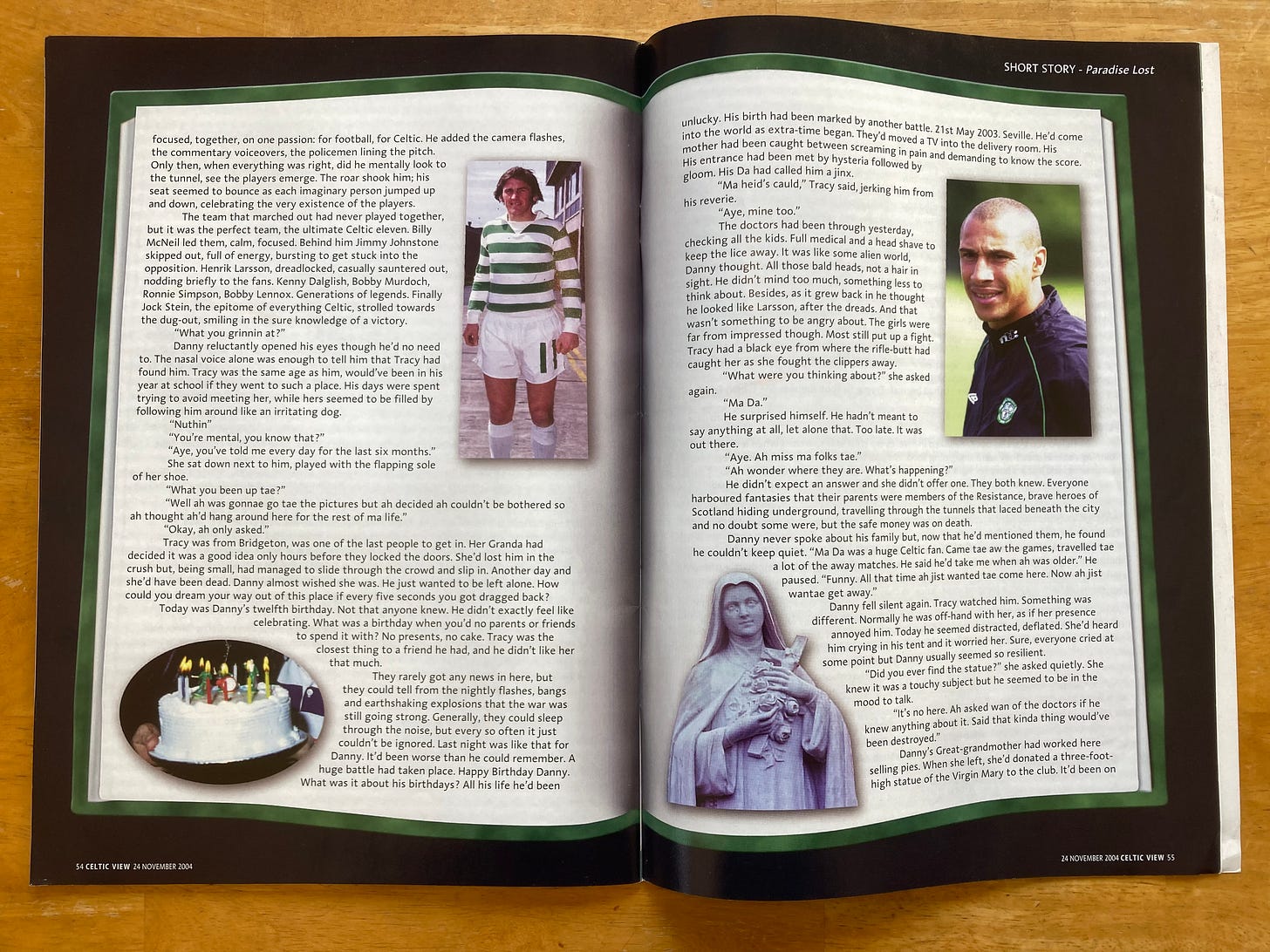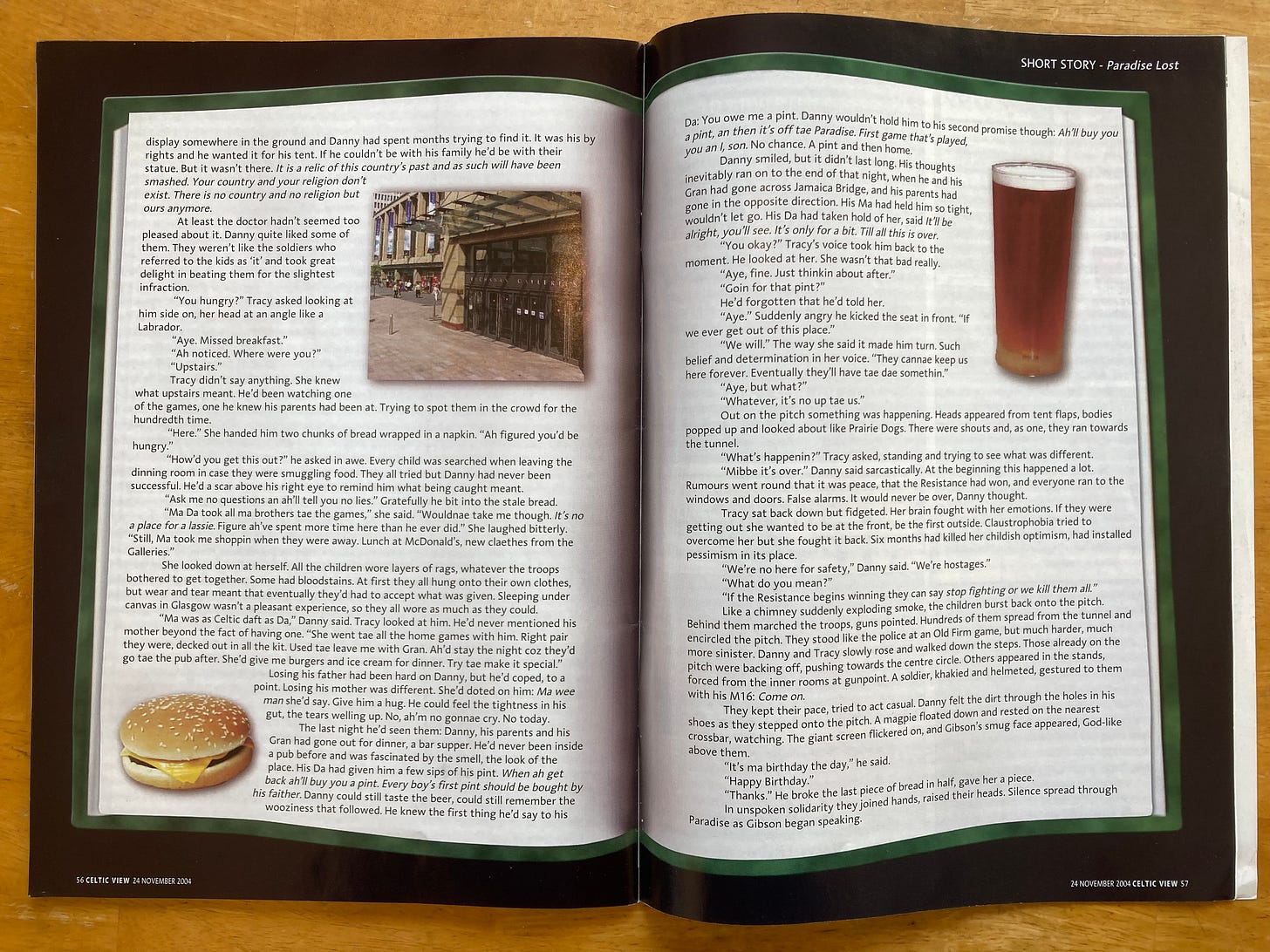This was the first piece of writing I ever got paid for. A commission by Celtic View who were doing a series of short stories by Celtic fans. Willy Maley put me in touch with Paul Cuddihy, the editor, who was, I think, somewhat surprised to receive some dystopian science fiction. Despite it being very different from the rest of the series, he published it nonetheless for which I am stil grateful. Paul later interviewed me on his Read all About it podcast, which you can listen to here.
The war had ravaged Glasgow. Black smoke perpetually covered the skyline; Searchlights swept over rubble and ruin. The Argyle Street flat Danny was born in no longer stood. Not much did. In a few places Glasgow was still recognisable: the Umbrella connecting the two sides of Central hung, seemingly immovable, though the station itself was nothing more than a husk, two barely standing walls and a bridge, wreckage of tracks hanging from either side. The road underneath was grooved from tank tracks, pitted with grenade craters. The university tower, decapitated by a downed helicopter, stuck into the skyline like a rotten tree. Bodies littered the streets. Only three buildings in the city remained untouched. Hampden, Ibrox and Celtic Park.
This was no accident. When war was declared, the Enemy’s communications director, a fat, officious fool called Gibson, had broadcast on all TV and radio channels, and over the net:
“In one week we will begin our bombardment. You will know what to expect from our victories elsewhere. Defeat is inevitable. Your Executive has had enough chances to avoid this but has failed you. However we are not barbarians. All civilians under the age of twelve should be placed in the three main football stadia where they will remain untouched. We have no quarrel with the young. Anyone found outside these locations will be considered fair game. The stadia will be guarded by our troops. Anyone not included in the above category found inside will be in breach of these conditions and will be dealt with appropriately.”
At first people didn’t know what to do. Some were defiant, refusing to accept defeat as a possibility. Those who’d closely followed the other invasions knew what to expect and wanted to hang on to normality while they could. Many tried to run. Airports saw the first violence as families fought over tickets, tried to force their way onto already overcrowded planes. By the time the deadline came round, Glasgow, like every other Scottish city, was in a state of high anxiety. Some parts of the city had descended into anarchy, fighting and looting doing the work of the troops before they’d even arrived. Other places were eerily calm. The city centre was like the eye of a storm as families said their goodbyes, quietly preparing for the next day.
Around the football grounds it was chaos. Those, like Danny’s gran, who were taking no chances, wanted to see their children safe inside. Fights broke out as the crowd were bottlenecked into the narrow channels, gridlocked. Many fell in the crush; parents were prematurely separated from their kids by the swinging mass of bodies. Some never made it to the doors. Other got there only by climbing over the prone forms of the unlucky. Inside the children wandered about in shock. For many their last glimpse of a mother or father had been of them throwing a punch, shouting run, just get inside. Whatever you do, get inside. Their parents had turned into animals before their eyes. Celtic Park echoed with the sound of crying.
That was six months ago.
Danny sat in row F and looked out over the pitch. All available space from touchline to touchline was filled with tents. Flags, shirts, poles with shoes hung on top rose above the originally regimented ranks. Markers so Danny and his fellow inmates could find their homes easily and quickly. Not that it mattered. Every minute of every day for six months had been spent on the pitch, in the stands, and in the back rooms. There was no one here who couldn’t wind his way through the canvas maze and find their own tent, even in pitch darkness.
Sections of the stand had been destroyed. Black gaps like missing teeth interrupted the three white stripes that circled the seating. The paintwork, green, white and gold, was chipped, peeling. Doors hung from their hinges and advertising hoardings lay snapped where they’d fallen. Few of the lights still worked, and those that did cast disturbing shadows across the tents at night. The roof sign now read CELT C F OT ALL CL 888, the missing letters, knocked clean by the nightly bombardments, had been appropriated by the kids. One, Bob, had managed to get his hands on the letters that spelt his name and leant them against his tent. The weight let the rain in but he refused to relinquish his prize. The beautiful stadium, the Church of Celtic, had been desecrated. Paradise lay in ruins, lost.
Rubbing his closely shaved head Danny closed his eyes and tried to imagine Parkhead as it had been.
Despite his father’s promises he’d never been until the day he was left there. But in the last six months he’d wandered every corridor, been in every room, studied everything. He’d each picture memorised, down to the finest detail. He’d read every history, watched all the documentaries, all the archived matches. Six months had solidified Danny’s status as a Celtic fan.
In his mind’s eye he erased the tents, the people, the decay until the stadium was returned to its pristine pre-match beauty. He then added the sixty-odd thousand fans, each decked in the green and white hoops, waving scarves and flags, all focused, together, on one passion: for football, for Celtic. He added the camera flashes, the commentary voiceover’s, the policemen lining the pitch. Only then, when everything was right, did he mentally look to the tunnel, see the players emerge. The roar shook him; his seat seemed to bounce as each imaginary person jumped up and down, celebrating the very existence of the players.
“What you grinnin at?”
Danny reluctantly opened his eyes, though he’d no need to. The nasal voice alone was enough to tell him that Tracy had found him. Tracy was the same age as him, would’ve been in his year at school if they went to such a place. His days were spent trying to avoid meeting her, while hers seemed to be filled by following him around like an irritating dog.
“Nuthin”
“You’re mental, you know that?”
“Aye, you’ve told me every day for the last six months.”
She sat down next to him, played with the flapping sole of her shoe.
“What you been up tae?”
“Well ah was gonnae go tae the pictures but ah decided ah couldn’t be bothered so ah thought ah’d hang around here for the rest of ma life.”
“Okay, ah only asked.”
Tracy was from Bridgeton, was one of the last people to get in. Her granda had decided it was a good idea only hours before they locked the doors. She’d lost him in the crush but, being small, had managed to slide through the crowd and slip in. Another day and she’d have been dead. Danny almost wished she was. He just wanted to be left alone. How could you dream your way out of this place if every five seconds you got dragged back?
Today was Danny’s twelfth birthday. Not that anyone knew. He didn’t exactly feel like celebrating. What was a birthday when you’d no parents or friends to spend it with? No presents, no cake. Tracy was the closest thing to a friend he had, and he didn’t like her that much.
They rarely got any news in here, but they could tell from the nightly flashes, bangs and earthshaking explosions that the war was still going strong. Generally, they could sleep through the noise, but every so often it just couldn’t be ignored. Last night was like that for Danny. It’d been worse than he could remember. A huge battle had taken place. Happy Birthday, Danny.
“Ma heids cauld”, Tracy said, jerking him from his reverie.
“Aye, mine too.”
The doctors had been through yesterday, checking all the kids. Full medical and a head shave to keep the lice away. It was like some alien world, Danny thought. All those bald heads, not a hair in sight. He didn’t mind too much, something less to think about. The girls were far from impressed though. Most still put up a fight. Tracy had a black eye from where the rifle-butt had caught her as she fought the clippers away.
“What were you thinking about?” she asked again.
“Ma da.”
He surprised himself. He hadn’t meant to say anything at all, let alone that. Too late. It was out there.
“Aye. Ah miss ma folks tae”.
“Ah wonder where they are. What’s happening?”
He didn’t expect an answer and she didn’t offer one. They both knew. Everyone harboured fantasies that their parents were members of the Resistance, brave heroes of Scotland hiding underground, travelling through the tunnels that laced beneath the city and no doubt some were, but the safe money was on death.
Danny never spoke about his family but, now that he’d mentioned them, he found he couldn’t keep quiet. “Ma da was a huge Celtic fan. Came tae aw the games, travelled tae a lot of the away matches. He said he’d take me when ah was older.” He paused. “Funny. All that time ah jist wanted tae come here. Now ah jist wantae get away.”
Danny fell silent again. Tracy watched him. Something was different. Normally he was off-hand with her, as if her presence annoyed him. Today he seemed distracted, deflated. She’d heard him crying in his tent and it worried her. Sure, everyone cried at some point but Danny usually seemed so resilient.
“Did you ever find the statue?” she asked quietly. She knew it was a touchy subject but he seemed to be in the mood to talk.
“It’s no here. Ah asked wan of the doctors if he knew anything about it. Said that kinda thing would’ve been destroyed.”
Danny’s great-grandmother had worked here selling pies. When she left, she’d donated a three-foot-high statue of the Virgin Mary to the club. It’d been on display somewhere in the ground and Danny had spent months trying to find it. It was his by rights and he wanted it for his tent. If he couldn’t be with his family he’d be with their statue. But it wasn’t there. It is a relic of this country’s past and as such will have been smashed. Your country and your religion don’t exist. There is no country and no religion but ours anymore. At least the doctor hadn’t seemed too pleased about it. Danny quite liked some of them. They weren’t like the soldiers who referred to the kids as ‘it’ and took great delight in beating them for the slightest infraction.
“You hungry?” Tracy asked looking at him side on, her head at an angle like a Labrador.
“Aye. Missed breakfast.”
“Ah noticed. Where were you?”
“Upstairs.”
Tracy didn’t say anything. She knew what upstairs meant. He’d been watching one of the games, one he knew his parents had been at. Trying to spot them in the crowd for the hundredth time.
“Here.” She handed him two chunks of bread wrapped in a napkin. “Ah figured you’d be hungry.”
“How’d you get this out?” he asked in awe. Every child was searched when leaving the dinning room in case they were smuggling food. They all tried but Danny had never been successful. He’d a scar above his right eye to remind him what being caught meant.
“Ask me no questions an ah’ll tell you no lies.” Gratefully he bit into the stale bread.
“Ma da took all ma brothers tae the games,” she said. “Wouldnae take me though. It’s no a place for a lassie. Figure ah’ve spent more time here than he ever did.” She laughed bitterly. “Still, Ma took me shoppin when they were away. Lunch at MacDonald’s, new claethes from the Galleries.” She looked down at herself. All the children wore layers of rags, whatever the troops bothered to get together. Some had bloodstains. At first they all hung onto their own clothes, but wear and tear meant that eventually they’d had to accept what was given. Sleeping under canvas in Glasgow wasn’t a pleasant experience, so they all wore as much as they could.
“Ma was as Celtic daft as Da.” Danny said. Tracy looked at him. He’d never mentioned his mother beyond the fact of having one. “She went tae all the home games with him. Right pair they were, decked out in all the kit. Used tae leave me with Gran. Ah’d stay the night coz they’d go tae the pub after. She’d give me burgers and ice cream for dinner. Try tae make it special.”
Losing his father had been hard on Danny, but he’d coped, to a point. Losing his mother was different. She’d doted on him: Ma wee man she’d say. Give him a hug. He could feel the tightness in his gut, the tears welling up. The last night he’d seen them: Danny, his parents and his gran had gone out for dinner, a bar supper. He’d never been inside a pub before and was fascinated by the smell, the look of the place. His Da had given him a few sips of his pint. When ah get back ah’ll buy you a pint. Every boy’s first pint should be bought by his faither. Danny could still taste the beer, could still remember the wooziness that followed. He knew the first thing he’d say to his Da: You owe me a pint. Danny wouldn’t hold him to his second promise though: Ah’ll buy you a pint, an then it’s off tae Paradise. First game that’s played, you an I, son. No chance. A pint and then home.
Danny smiled, but it didn’t last long. His thoughts inevitably ran on to the end of that night, when he and his gran had gone across Jamaica Bridge, and his parents had gone in the opposite direction. His Ma had held him so tight, wouldn’t let go. His Da had taken hold of her, said It’ll be alright, you’ll see. It’s only for a bit. Till all this is over.
“You okay?” Tracy’s voice took him back to the moment. He looked at her. She wasn’t that bad really.
“Aye, fine. Just thinkin about after.”
“Goin for that pint?”
He’d forgotten that he’d told her.
“Aye.” Suddenly angry he kicked the seat in front. “If we ever get out of this place.”
“We will.” The way she said it made him turn. Such belief and determination in her voice. “They cannae keep us here forever. Eventually they’ll have tae dae somethin.”
“Aye, but what?”
“Whatever, it’s no up tae us.”
Out on the pitch something was happening. Heads appeared from tent flaps, bodies popped up and looked about like prairie dogs. There were shouts and, as one, they ran towards the tunnel.
“What’s happenin?” Tracy asked, standing and trying to see what was different.
“Mibbe it’s over.” Danny said sarcastically. At the beginning this happened a lot. Rumours went round that it was peace, that the Resistance had won, and everyone ran to the windows and doors. False alarms. It would never be over, Danny thought.
Tracy sat back down but fidgeted. Her brain fought with her emotions. If they were getting out she wanted to be at the front, be the first outside. Claustrophobia tried to overcome her but she fought it back. Six months had killed her childish optimism, had installed pessimism in its place.
“We’re no here for safety,” Danny said. “We’re hostages.”
“What do you mean?”
“If the Resistance begins winning they can say stop fighting or we kill them all.”
Like a chimney suddenly exploding smoke the children burst back onto the pitch. Behind them marched the troops, guns pointed. Hundreds of them spread from the tunnel and encircled the pitch. They stood like the police at an Old Firm game, but much harder, much more sinister. Danny and Tracy slowly rose and walked down the steps. Those already on the pitch were backing off, pushing towards the centre circle. Others appeared in the stands, forced from the inner rooms at gunpoint. A soldier, khakied and helmeted, gestured to them with his M16: Come on. They kept their pace, tried to act casual. Danny felt the dirt through the holes in his shoes as they stepped onto the pitch. A magpie floated down and rested on the nearest crossbar, watching. The giant screen flickered on, and Gibson’s smug face appeared, God-like above them.
“It’s ma birthday the day,” he said.
“Happy Birthday.”
“Thanks.” He broke the last piece of bread in half, gave her a piece.
In unspoken solidarity they joined hands, raised their heads. Silence spread through Paradise as Gibson began speaking.







